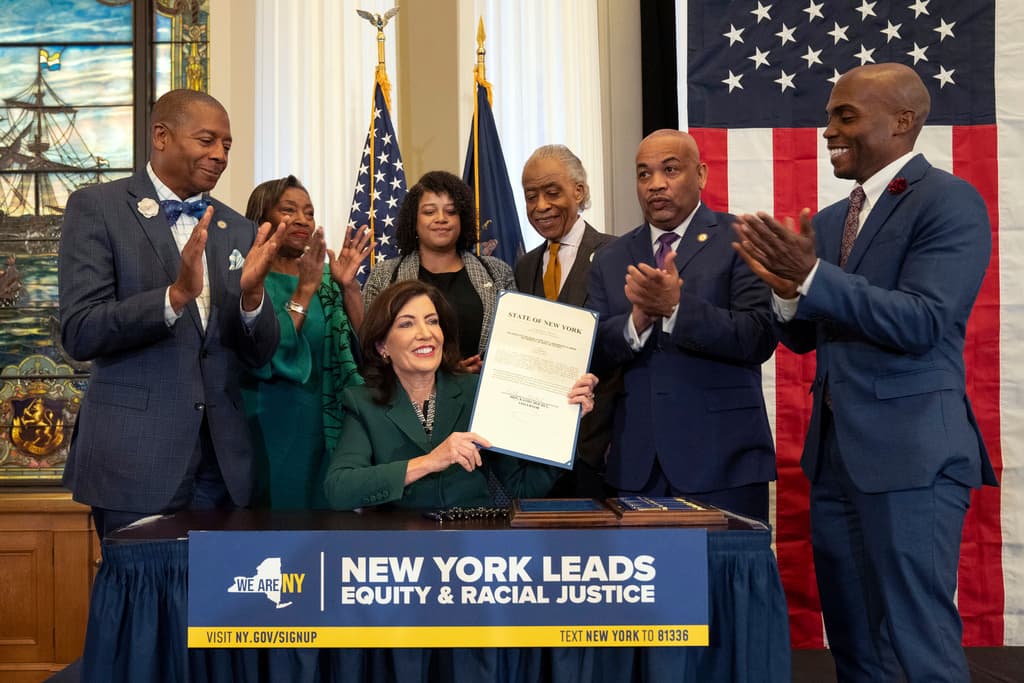New York Efforts To Pay Slavery Reparations Will Be ‘Vigorously Challenged,’ Says Man Behind Supreme Court’s Affirmative Action Case
Reparations backers have signaled that they hope New York can lead the country towards a ‘mass movement of reparations.’

Any New York state reparations legislation will be “vigorously challenged in federal court,” the reformer behind the Supreme Court’s landmark decision to block affirmative action in higher education, Edward Blum, tells the Sun.
His comments come as the state’s reparations commission, signed into law by Governor Hochul last year, is meeting on Monday to hear from the public — and as the clock is ticking towards its one-year deadline to come up with a recommendations report that is expected to shape legislative policy on reparations.
“Any legislation that awards reparations or benefits based on race or ethnicity will be vigorously challenged in federal court,” Mr. Blum tells the Sun in an email. “Racial proxies, including ancestral servitude and past discrimination, will be challenged as well.”
Mr. Blum is the president of Students for Fair Admissions, the plaintiff in the cases challenging Harvard University’s and the University of North Carolina’s race-based admissions policies. Mr. Blum, who has spent decades rallying against race-based policies, scored a major legal victory in the case when the Supreme Court held in 2023 that the universities’ admission policies violated the 14th Amendment’s Equal Protection Clause.
“Eliminating racial discrimination means eliminating all of it,” as Chief Justice Roberts wrote.
A student “must be treated based on his or her experiences as an individual — not on the basis of race,” the court’s majority opinion reads. “Many universities have for too long done just the opposite. And in doing so, they have concluded, wrongly, that the touchstone of an individual’s identity is not challenges bested, skills built, or lessons learned but the color of their skin.”
That decision has fueled legal momentum against the reparations movement, as the Sun has reported, and one lawsuit is already underway against Evanston, Illinois’ reparations program, which has handed out millions in taxpayer dollars to eligible Black residents.
Despite the legal threats and the mixed results of reparations efforts so far, cities and states have been racing ahead in their efforts and show no signs of slowing down next year. In California, for instance, although several high-profile reparations bills were blocked last session, supporters are already introducing reparations-related measures, including a bill to allow colleges to prioritize admission based on slave descendant status.
At the national level, civil rights groups appear to be gearing up for a reparations fight as well. With the “incoming Trump administration’s anticipated human rights violations looming on the horizon, now more than ever is it critical to concretize policies geared toward racial and reparatory justice,” the American Civil Liberties Union recently noted. As the country heads into the next presidential administration, it added, “It is not enough to safeguard the most basic rights owed to all Americans: we must advocate for reparatory justice so that we can finally reckon with our abysmal racial history.”
In New York, the state commission has been relatively quiet so far, but its last public meeting, in November, provided a glimpse into its work. That meeting kicked off with a local history lesson about slavery and discrimination, in which a presenter said “Racism created an unfair economic and political foundation in New York state.
“Wealth was derived from enslavement and it shaped institutions that remain in power to this day, from banks to real estate interests, to branches of state government and local government themselves,” the presenter said.
It is unclear whether the reparations commission will recommend forcing private institutions to pay for past discrimination. The Sun has made multiple attempts to reach the reparations commission for comment about its work so far.
The public comment period of the November meeting also indicated that reparations backers expect the commission to meet a wide array of demands.
One public commenter on behalf of New Yorkers for Reparations, Jackie Cody, called for financial compensation, public apologies, education initiatives, and other reforms. “New York state leads the country in so many ways,” she said, adding that the state can set the example for the country for a “mass movement of reparations.”
The commission members appear to have their work cut out for them if they’re to successfully appease reparations supporters.
“There is nothing that this country or this state could do to ever repay African Americans for what was done to us during the time of enslavement, that’s first and foremost, there’s no figure you can put on it,” one public commenter said. “Whatever happens, even if it comes out to $1 trillion, it still scratches the surface on what Black folks are owed in this country.”Yet budget hawks have previously told the Sun that the state simply “does not have the money to finance any new large programs,” such as reparations. New York has faced well-documented budget constraints, high taxes, and an exodus of residents and businesses to other states.

